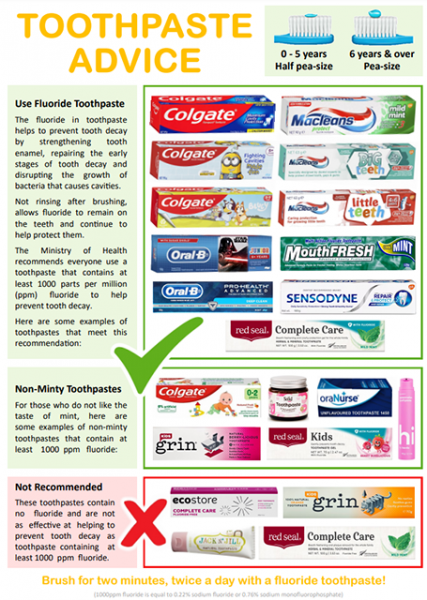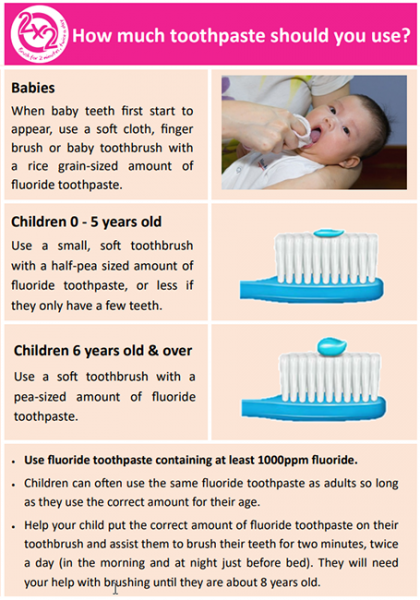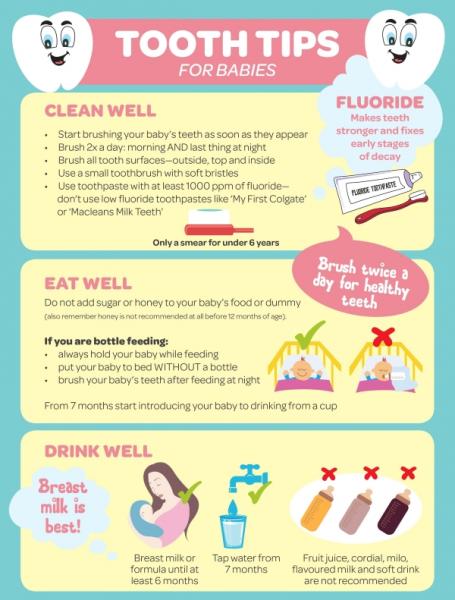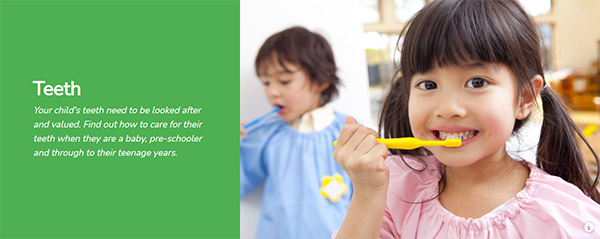Caring For Your Baby's Teeth
Caring For Your Baby's Teeth
Pēpi will start getting their first teeth at around 6 months. Find out how you can look after them.
What you need to know about your baby's teeth
Teeth start forming in the womb and most babies are born with a full set of 20 baby teeth, usually hidden under their gums.
Babies' teeth usually start to appear between 6 to 10 months, but some are born with teeth showing above the gums and some take longer.
It's important you take care of your baby's teeth as healthy baby teeth are needed for chewing and proper speech development.
Teeth and teething
Many babies' teeth come through without any problems, but for some the gums swell and become sore as teeth break through.
What is teething?
Teething is when your baby's teeth come through the gums. While most babies are born with a full set of 20 teeth, they don't usually appear through the gums until between 6 to 10 months.
The lower (bottom) front teeth usually come through the gum first. These are followed by the upper (top) front teeth. The picture below shows when each tooth usually appears.
The bottom front teeth come through at 6–10 months, and the top front teeth at 8–12 months. Then, the top teeth on either side at 9–13 months, and the bottom teeth on either side at 10–16 months. The first top molar teeth come in at 13–19 months. The first bottom molars come in at 14–18 months. Then the top canines at 16–22 months and the bottom canines at 17–23 months. The last bottom molars come through at 23–31 months, and the last top molars at 25–33 months.
Many babies' teeth come through without any problems, but for some the gums swell and become tender as teeth break through.
Your teething baby may:
- cry
- have a slight fever
- have red cheeks
- drool
- not eat or sleep well
- want to bite something hard
How can I help my teething baby?
The following may help your pēpi if they are upset:
- give your baby something to chew on, such as a clean teething ring
- rub some teething gel on their gums, especially before feeding
If your baby has a lot of pain, bleeding or pus in their gums or swelling in the mouth or face, get help from a dentist, doctor or nurse or call Healthline (0800 611 116).
Teething doesn't make babies sick. If your baby is unwell, check with your Well Child Tamariki Ora nurse or your doctor. Ring Healthline (0800 611 116) if you can't get to a doctor easily.
Find out how to care for your toddler and pre-schooler's teeth
How to care for your baby's teeth
Healthy teeth = a healthy smile.
Follow these 5 steps to protect your baby's smile:
- Brush teeth twice a day.
- Use fluoride toothpaste.
- Have regular dental check-ups.
- Lift the lip every month to check for signs of tooth decay (holes).
- Choose healthy foods and drinks.
Brush teeth twice a day
Your baby will start getting their first teeth at around 6 months. These first teeth will help your baby to eat and speak well. Healthy baby teeth usually mean healthy adult teeth too, so it's important that you look after your baby's first teeth.
You can start cleaning your baby's teeth before they show by gently wiping their gums with a clean, damp facecloth or gauze wrapped around your finger. This helps your baby get used to you touching their teeth and gums.
As soon as your baby's teeth start to show, start brushing. Use a small, soft brush and a half-pea size amount of regular-strength fluoride toothpaste twice a day. One brushing should be at night before your baby goes to bed.
Some tips for brushing your baby's teeth:
- hold your baby in a position where you can see their mouth and where they feel secure
- cup their chin in your hands and rest their head against your body
- clean their teeth using gentle circular motions
- lift their lips to brush the front and back of the teeth and at the gum line
- when finished, rinse the toothbrush and store it in an upright position so it can air-dry - make sure it's not touching other toothbrushes as that can cause germs to move from one brush to another
Check out which toothpaste to use, which ones to avoid, and how much to use (PDF, 5.5MB).
Watch a video about how parents make sure they brush their children's teeth twice a day
Use fluoride toothpaste
Fluoride makes teeth stronger and reduces tooth decay (holes). Use a 1000 parts per million (ppm) regular-strength fluoride toothpaste for your baby's teeth.
Regular dental check-ups
Oral healthcare is free for all children until they turn 18. Enrol your baby with the service as early as possible, so that you can arrange the first check-up. Regular check-ups increase the chances of finding and treating any tooth decay early. To enrol your baby with a service or to make an appointment, phone 0800 TALK TEETH (0800 825 583).
Find out more about dental care in New Zealand
Lift the lip every month
Gently lift your baby's top lip once a month to check inside their mouth. It’s a quick and easy way to see if tooth decay is present. You can read about tooth decay and what to look for on the Plunket website.
If you are worried about your baby's teeth, talk with your Well Child Tamariki Ora nurse at the next visit, or with your doctor, or contact your Community Oral Health Service.
Choose healthy foods and drinks
It’s best to exclusively breastfeed your baby for the first 6 months of their life and continue to breastfeed until they are at least 1 year of age.
Your baby may be ready to start eating solid food at around 6 months of age. To protect your baby's teeth, choose healthy foods and drinks. Sweet drinks, foods and fruit juices can cause tooth decay and cause your baby to develop a taste for sweet foods. (For tips on reducing the amount of sugar in your baby's food and drink, see the section on the UK NHS Choices website about preventing tooth decay by cutting down on sugar). Find out more about starting your baby on solid food.
Don't put your baby to bed with a bottle. Going to sleep with a bottle of milk, a warm chocolate drink or juice will start to cause tooth decay. If they want to suck on something to settle themselves, it's better to use a pacifier/dummy.
Watch this video to find out why your child's first teeth are important and how to care for them. Transcript available at the Ministry of Health website.
Check out these tooth tips for babies (PDF, 109KB)
See more KidsHealth content on caring for your child's teeth
This page last reviewed 29 April 2022.
Do you have any feedback for KidsHealth?
If you have any feedback about the KidsHealth website, or have a suggestion for new content, please get in touch with us.
Email us now




